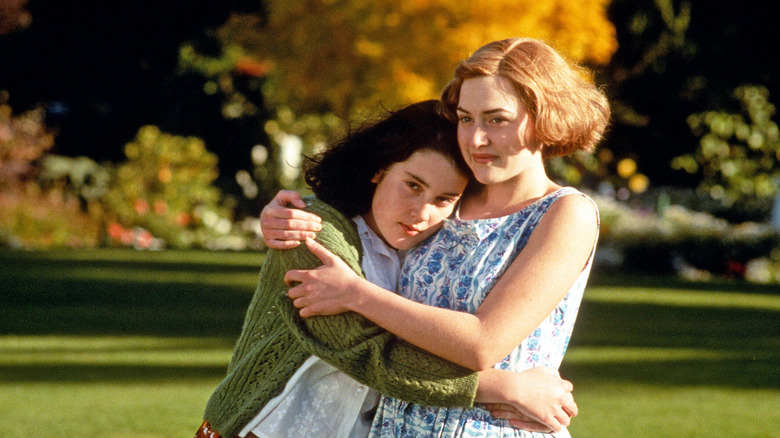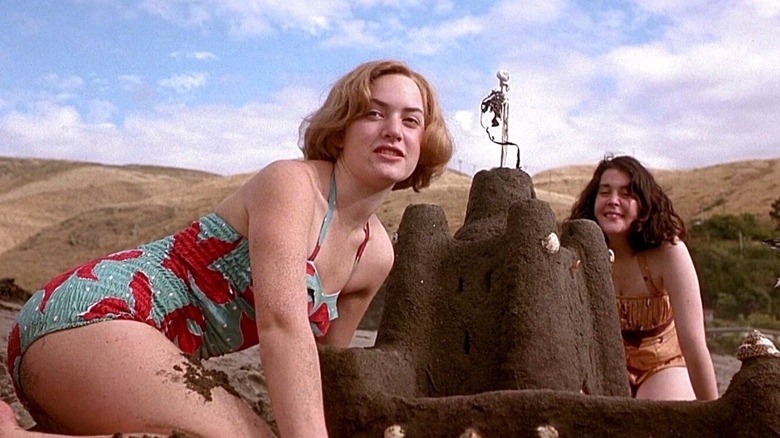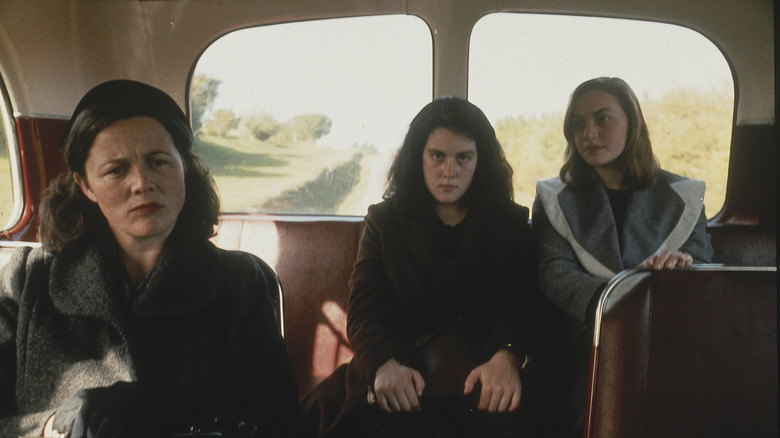Peter Jackson's Award-Winning Drama Starring Kate Winslet Is Almost Impossible To Watch Today
In the early '90s, "The Lord of the Rings" was just that weird cartoon from Ralph Bakshi, the most famous Kate was "heroin chic" supermodel Kate Moss, and Kiwi director Peter Jackson was only really on the radar of gorehounds thanks to his splattery, low-budget horror comedies like "Bad Taste" and "Braindead." That all began to change with the arrival of "Heavenly Creatures" in 1994, a fantastical period drama about a sensational but mostly forgotten true-life crime.
Distributed internationally under the Miramax banner (with "In a World" voiceover master Don LaFontaine doing his thing on the trailer), "Heavenly Creatures" was the first Jackson film you might actually take your mum to watch at the cinema. It also introduced the world to two young unknown actresses, Kate Winslet and Melanie Lynskey, playing a pair of schoolgirls whose retreat into an imaginary world leads to obsession, insanity, and murder.
"Heavenly Creatures" was a minor sensation that made decent money on a limited release and received positive notices from critics, later featuring on many year-end lists. The movie also grabbed some attention at festivals and on the awards circuit, with Winslet receiving most of the plaudits for her eye-catching turn as Juliet Hulme, the more energetic half of the killer duo. Despite the buzz, "Heavenly Creatures" was overlooked for most of the big awards, perhaps because it had the misfortune to come out in one of the strongest years for cinema in recent decades. (It did receive one Oscar nomination, for Best Original Screenplay.)
The success of the film marked Winslet as a major talent for the future, and she earned her first Academy Award nomination with her next appearance in Ang Lee's "Sense and Sensibility." For Jackson, "Heavenly Creatures" paved the way to "The Lord of the Rings" trilogy. Weta Digital was created to handle the special effects, and the film landed him his Hollywood debut, "The Frighteners," ultimately enabling him to get his version of J.R.R. Tolkien's classic fantasy novel to the screen. Lynskey's subsequent career was less overtly spectacular, but (as my colleague BJ Colangelo writes so brilliantly) she still f****** rules.
Yet for such a star-making film, "Heavenly Creatures" is almost impossible to find today. It isn't available for purchase or rental on streaming services, and there are only a few older copies of the DVD floating about for sale online. Let's take a closer look at what viewers are missing.
What is Heavenly Creatures all about?
A quaint opening montage introduces us to life in Christchurch, New Zealand, in 1952. This is where we meet Pauline Parker (Melanie Lynskey), a sullen and socially awkward 14-year-old girl from a working-class background. She doesn't have many friends at school, but that changes with the arrival of Juliet Hulme (Kate Winslet), a vivacious 13-year-old from England who has just moved to the city with her family. The pair bond over their love of fantasy, Italian-American tenor Mario Lanza, and debilitating illnesses while they were growing up.
Pauline has a tricky relationship with her mother Honora (Sarah Pierse) and spends much of her time with the well-to-do Hulmes, who welcome her into their home like another daughter. The girls are kindred spirits and create a fantasy world called Borovnia to play out their hopes and dreams, but it turns into a refuge when Juliet's parents announce a long trip to England without her, and Pauline's home life worsens. When Juliet is diagnosed with tuberculosis and gets quarantined in the hospital, Pauline and Juliet further blur the lines between reality and fantasy by writing long letters role-playing characters in their idyllic "fourth world."
Once the girls are reunited, their parents worry about the intensity of their friendship and a doctor deduces that homosexuality is the cause of Pauline's irascible behavior. The pair retreat further into their fantasies when they learn that Juliet's parents are divorcing and plan to leave Christchurch. They decide to run away together, deciding that the only thing holding them back is Pauline's mother. With only a few weeks before Juliet leaves, they plot a callous murder that they will pass off as an accident.
The real Parker-Hulme murder case was a sensation in New Zealand when details about the girls' relationship emerged during the murder trial in 1954. The idea to make a feature film about it originated with Fran Walsh, Peter Jackson's co-producer, co-writer, and wife, and they were determined to focus on the relationship between the culprits rather than the murder itself. In a 1994 interview, Jackson said that the case had been misunderstood and sensationalized as a "lesbian schoolgirl killer" story, and that was something he and Walsh wanted to address. Working from Pauline Parker's real-life diary (which provides verbatim narration in the film), Jackson took us deep into their world of unhealthy make-believe instead.
How does Heavenly Creatures hold up today?
Jackson made some bold choices with "Heavenly Creatures" that could have easily been distasteful given the true-life nature of the story. A less imaginative director might have been tempted to play it deadly serious, but Jackson's fantasy elements provide the film with giddy humor and an off-kilter energy that transports us into the fevered headspace of the two girls. Neither of their real lives is particularly terrible, but these flights of fancy contrast neatly with the modest, buttoned-down daily life of '50s New Zealand and play as an extension of their obsession with one another.
With such a determined focus on Pauline and Juliet's relationship rather than the murder itself, the film demanded strong performances from its young leads. Luckily, Jackson found two prodigious talents in Melanie Lynskey and Kate Winslet, who became close friends on set (Lynskey later admitted she was heartbroken when they drifted apart after Winslet shot to superstardom with "Titanic" a few years later). Out of the two, Winslet's breakthrough performance has aged the worst; Juliet is full of cheery vigor that masks deeper insecurities, but she's dialed up to the max for the whole movie. Her character is supposed to be annoying, but Winslet's portrayal seems even more one-note in retrospect now we know she is capable of delivering powerful turns with more subtlety. By contrast, Lynskey's performance as the awkward and misunderstood introvert grounds the film whenever Winslet or the fantasy sequences threaten to go too far.
Beyond the two stars of "Heavenly Creatures," the secret MVP is Sarah Peirse as Pauline's mother. I recall thinking she was a bit of a nag and instinctually siding with the girls when I first watched the film as a teenager, but now that I'm older, I see a sensitive portrait of a concerned parent trying to do her best for her daughter, and her demise is painfully sad. Jackson handles the murder sensitively, delivering a haunting final scene of ethereal beauty set to Puccini's "The Humming Chorus" from "Madame Butterfly." Stories about complicated female relationships have been handled with more nuance since ("Ghost World," "My Summer of Love"), but "Heavenly Creatures" is still an absorbing study of toxic young love. It's also fascinating to see the launchpad from which the careers of Lynskey, Winslet, and Jackson took off, and the movie that indirectly opened a cinematic portal to Middle-earth.


